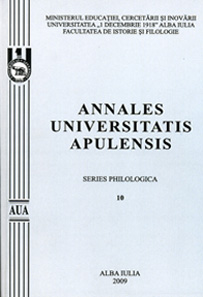DEBATING AS A COMMUNICATIVE EVENT: A LOOK THROUGH HYMES’ LENSES
DEBATING AS A COMMUNICATIVE EVENT: A LOOK THROUGH HYMES’ LENSES
Author(s): Ronald R. JacobsenSubject(s): Language and Literature Studies
Published by: Universitatea »1 Decembrie 1918« Alba Iulia
Keywords: socio-pragmatics; practice(s); voice(s); participant roles; imaginary speakers and audiences; persuasive communication.
Summary/Abstract: Abstract: The overall aim of this paper is to investigate ways of studying “debating” across different domains and/or arenas of language use, ranging from presidential debates to smaller-scale events, such as, for instance, the town hall meeting of a local community, the interactive lecture of a university course, and the discussion periods of an academic conference. The paper takes its point of departure in Jacobsen (2010), which is a cognitive-pragmatic study of the 2004 US Presidential Debates between John F Kerry and George W. Bush. This approach differs from other approaches in that it assigns higher priority to a number of components, or aspects of such components, of a debating event the roles of which are typically down-played in the literature. For instance, it can be said to rate norms of interpretation higher than norms of interaction; divergent, individual, and situationally determined goals/outcomes higher than common and conventional ones; and role/voice ambiguities, including quotation phenomena, higher than power and social distance relations among participants. The cognitive-pragmatic results obtained in Jacobsen (2010) are reanalyzed within a socio-pragmatic framework, namely Dell Hymes’ S.P.E.A.K.I.N.G. Model (1964, 1972, 1974). Not only does this model appear ideally suited for studying linguistic-pragmatic phenomena, such as “debating,” across different arenas of language use, it also offers a way of recasting/testing the results obtained in Jacobsen (2010) in socio-pragmatic terms. Within this context, the scope of the paper is restricted to the more general properties of presidential debates, as evidenced by the three debates between Bush and Kerry in the 2004 US Presidential Election. In addition, it assigns central prominence to the most obvious, linguistic-pragmatic aspect of triadic interactions, the kind of role/voice ambiguities that their turns not only are prone to trigger, but also rely heavily upon in their interpretations.
Journal: Annales Universitatis Apulensis. Series Philologica
- Issue Year: 11/2010
- Issue No: 4
- Page Range: 129-148
- Page Count: 20
- Language: English

